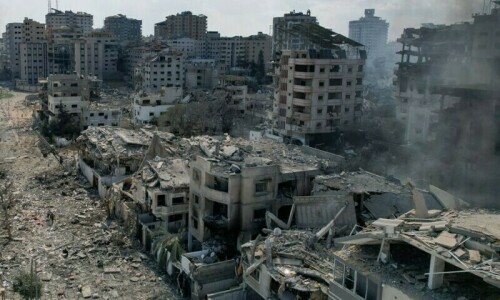The registration process due to its many complexities has been a tedious one, and while IDP camp administrators claim otherwise, there have been many cases in which people were either not registered or they fell prey to the loopholes in the system.
According to Khalid Aziz, chairman of the Regional Institute of Policy Research and Training (RIPORT), of the three million people who were displaced, roughly 25 per cent remain unregistered. Women, he says, were the worst affected. This was because in most cases it was either the husband or the father, who would put down the details of the family on his form and in the event of his death or disappearance, there would be never-ending transition process — especially the paper work — for the new head of the family to take charge. The delay would keep a number of women from getting the aid due to them. Single women especially faced several problems. Naseem Akhtar, a mother of four, lost all hope of receiving any aid after she returned empty-handed several times from the registration point at Sang-i-Marmar, Mardan, before she came to Karachi to try her luck.
Many failed to acquire 'Yellow forms', the document that would form the basis of the registration process which after being filled-out was to be submitted to the Social Security Office so that details of displaced individuals could be computerised. This blocked access to the 'Green Card' that was imperative to acquire ration at various food points and the ATM cards through which each displaced family would receive the promised Rs25,000 to aid them with the repatriation process.
According to sources, almost 800 camp residents at Shah Masoor Camp in Swabi failed to acquire Yellow forms, which was the main reason for their diffidence to return. Most IDPs allege that they were cheated since promises of them receiving cash cards after reaching Swat, remain unfulfilled even after several months. But can the government solely be blamed for this?
27-year-old Subhan Ali, from Kanju in Swat district disagrees and says that late evacuations contributed largely to hiccups in the registration process. He asserts that by the time some evacuees reached Mardan, all registrations were closed. However, he stresses that close monitoring of the process would have made it more transparent thereby leaving no room for corruption that has had a negative impact on the psyche of the IDPs whose sustenance depended on it. This has led to feelings of alienation which if left untended could cost the region its peace once again.
Ali, although registered, could not get aid because he shared the number of his father's family. This was due to the reason that when his father registered, Ali was listed on the form. This has kept him from acquiring an ATM card although he has his own family. His brother faces the same ordeal.
An average family in Swat consists of 7-8 members, and if the family has married sons, this adds to the burden, since all are dependent on a single cash card worth a mere Rs25,000. A frequent visitor to the Nadra office in Saidu Sharif, Ali, despite submitting his wife's identity card and their Nikahnama in August, still awaits a decision.
With no concrete reconstruction and re-compensation policies in place and no access to the aid they were promised, the situation has further disorientated the people, who in many cases after a lifetime of toil had constructed an abode for themselves, which were destroyed as a result of the military operation in the region.
Resuming registrations and sorting out pending cases, according to Mr Aziz, would not only strengthen the confidence level of the people of the region, but would also reinforce the security situation there.
This would give the government complete record of residents, which would make it easier to identify outside elements. This is all the more imperative in view of the volatility that the region experiences due to its proximity to areas in which the military operation continues.











































Dear visitor, the comments section is undergoing an overhaul and will return soon.